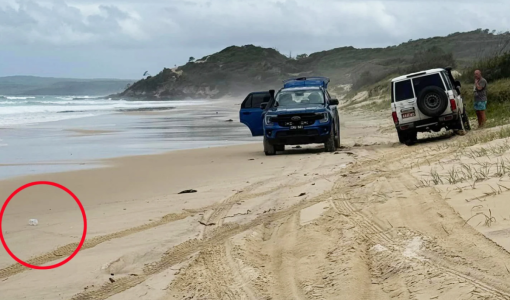Avoid hefty fines at this popular beach: Tourists expose costly illegal acts you must know about!
By
- Replies 16
Australia's natural beauty is one of our greatest treasures, and it's up to all of us to preserve it for future generations. However, not everyone is on board with this responsibility, as evidenced by a recent incident at Queensland's K'gari, formerly known as Fraser Island, a popular 4WD beach destination.
A concerned traveller took to social media to express their outrage after witnessing another visitor's careless act of littering. The post quickly gained traction online and included photos showing two 4WD vehicles parked on the pristine sands, with an empty plastic bottle discarded nearby. The poster was incensed, claiming to have seen the bottle being thrown out of one of the vehicles' windows.
'Imagine littering here,' the witness lamented, highlighting the gravity of such an act in a world heritage listed site. K'gari is not only a hotspot for tourists but also a protected area where the natural environment is of paramount importance. The Queensland Department of Environment, Science and Innovation (DESI) has noted a troubling increase in people intentionally dumping rubbish, including camping gear and other waste.
The department expressed their disappointment, stating, 'It's extremely disappointing to see some people have such a blatant disregard and disrespect for the unique environment of K’gari.' They urged all visitors to treat the island with the respect it deserves, given its World Heritage status.
The consequences of such disrespect can be severe. Rangers are vigilant in monitoring camping areas, and on-the-spot fines can be issued for unlawful rubbish disposal—$322.60 for general littering and a steeper $483 for failing to secure food and rubbish from the island's dingos, known locally as Wangari.
The community's response to the incident was one of shared frustration, with many suggesting that those caught littering should face harsher penalties, such as being banned from driving on any beach. This sentiment extends beyond K'gari, as the problem of littering and illegal dumping is becoming more widespread across the country's camping grounds.
K'gari's regulations are strict for a reason. The island is home to significant cultural and ecological features, including a massive whalebone and the famous shipwreck, which tourists are warned to avoid. Additionally, strict rules prohibit feeding and interacting with the island's dingos to protect the animals and visitors.
The maximum penalty for severe illegal acts in Queensland, such as attempting to remove culturally or ecologically important items like the whalebone, can reach a staggering $483,900 or two years in prison.
As a member of the Seniors Discount Club, which cherishes Australia's weird and wonderful environment, I know that it's crucial to lead by example and follow all rules and regulations when visiting such treasured sites. Not only does this help preserve our natural heritage, but it also ensures that we avoid hefty fines that can dampen our travel experiences.
 We encourage all our readers to be mindful of their impact on the environment when enjoying Australia's beautiful outdoors. Have you visited K'gari or other protected areas in Australia? Please share your experiences and thoughts on how we can all contribute to keeping these places pristine in the comments below. Let's work together to keep Australia beautiful for everyone to enjoy!
We encourage all our readers to be mindful of their impact on the environment when enjoying Australia's beautiful outdoors. Have you visited K'gari or other protected areas in Australia? Please share your experiences and thoughts on how we can all contribute to keeping these places pristine in the comments below. Let's work together to keep Australia beautiful for everyone to enjoy!
A concerned traveller took to social media to express their outrage after witnessing another visitor's careless act of littering. The post quickly gained traction online and included photos showing two 4WD vehicles parked on the pristine sands, with an empty plastic bottle discarded nearby. The poster was incensed, claiming to have seen the bottle being thrown out of one of the vehicles' windows.
'Imagine littering here,' the witness lamented, highlighting the gravity of such an act in a world heritage listed site. K'gari is not only a hotspot for tourists but also a protected area where the natural environment is of paramount importance. The Queensland Department of Environment, Science and Innovation (DESI) has noted a troubling increase in people intentionally dumping rubbish, including camping gear and other waste.
The department expressed their disappointment, stating, 'It's extremely disappointing to see some people have such a blatant disregard and disrespect for the unique environment of K’gari.' They urged all visitors to treat the island with the respect it deserves, given its World Heritage status.
The consequences of such disrespect can be severe. Rangers are vigilant in monitoring camping areas, and on-the-spot fines can be issued for unlawful rubbish disposal—$322.60 for general littering and a steeper $483 for failing to secure food and rubbish from the island's dingos, known locally as Wangari.
The community's response to the incident was one of shared frustration, with many suggesting that those caught littering should face harsher penalties, such as being banned from driving on any beach. This sentiment extends beyond K'gari, as the problem of littering and illegal dumping is becoming more widespread across the country's camping grounds.
K'gari's regulations are strict for a reason. The island is home to significant cultural and ecological features, including a massive whalebone and the famous shipwreck, which tourists are warned to avoid. Additionally, strict rules prohibit feeding and interacting with the island's dingos to protect the animals and visitors.
The maximum penalty for severe illegal acts in Queensland, such as attempting to remove culturally or ecologically important items like the whalebone, can reach a staggering $483,900 or two years in prison.
As a member of the Seniors Discount Club, which cherishes Australia's weird and wonderful environment, I know that it's crucial to lead by example and follow all rules and regulations when visiting such treasured sites. Not only does this help preserve our natural heritage, but it also ensures that we avoid hefty fines that can dampen our travel experiences.
Key Takeaways
- A traveller has exposed someone for allegedly littering a plastic bottle at Queensland's K'gari, a popular 4WD beach and world heritage listed site.
- Littering in this area can lead to significant fines, up to $483 for littering and $483,900 or two years in prison for more severe illegal acts.
- The Department of Environment, Science and Innovation reported an increase in illegal dumping of rubbish, including camping gear, at K’gari.
- Rangers monitor the area, and on-the-spot fines can be issued for improper rubbish disposal and not keeping food and rubbish secure from the local wildlife, such as dingos.








